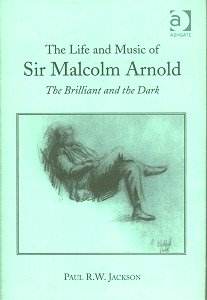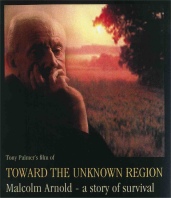'The Life and Music of Sir Malcolm Arnold - The Brilliant and the Dark'

Date published: February 2003
ISBN: 978-1-85928-381-3
Author: Paul R.W. Jackson
Published by Ashgate
ISBN: 978-1-85928-381-3 : February 2003
Source: Ashgate
Foreword
' Writing in his 1979 survey of British music Peter J. Pirie apropos Malcolm Arnold had this to say, ‘If he had not existed it might have been necessary to invent him’, in that sentence one can detect the exasperation the nuns in The Sound of Music voice in ‘How do you solve a problem like Maria’. And exasperation is something that most of the critical establishment in Britain have felt towards Arnold at sometime or another, even from the early 50’s when he burst on the scene with works such as, the English Dances and the 2nd Symphony, and he was seen as the most promising of the generation of composers younger than Britten, the critics have no known quite what to make of him. The more acuminous ones realised that his ‘compositional skill is the equal of some of the greatest composers of the twentieth century’, while others tried to paint him as an idiot savant, who because he did not flaunt them, knew nothing of the ‘developments’ in 20th century music.
That he did know the techniques of 20th century music is apparent to anyone taking more than a superficial look at any of his music, but for him the technique is hidden, it is not the concern of the public how a work has been constructed. Where some composers are happy, like some conceptual artist, to write a pamphlet, or have some apologist write one for them, to explain their music, Arnold’s does not need it, for him, writing from within the mainstream of the European symphonic tradition, music is ‘an act of social communication, the strongest there is’. He writes music to express what he cannot say in words.
Why then have I written a book on Malcolm Arnold’s life and music. Mainly I think because his life has had such a strong bearing on his music, and so little is known about it. He himself has said ‘all of my music is biographical’, and taking that as my starting point, what I have tried to do in this book is place his music within the context of his personal life and to look at some of his compositions, in particular the 9 symphonies, to see just how he sets about communicating.
I must stress here, if it needs saying, that these are my views, this is in no sense the authorised version. Although Sir Malcolm, his family, colleagues, and friends have been generous in answering my questions the conclusions are my own. '
Authors' Acknowledgements
' In practical terms I probably started writing this book three years ago, though I have probably been researching it since I first heard a piece of music that I could identify as by Malcolm Arnold over thirty years ago. In that time I have been collecting recordings, cuttings and information that have all been useful in writing this volume. In more recent times the book came about when Trudy Bliss suggested I write an article for inclusion in a volume on her late husband, Sir Arthur Bliss, and introduced me to Stewart Craggs who was editing that volume. He was at the time beginning work on a bibliography of Arnold’s music, now published and totally invaluable, and he suggested I conduct the present publishers. To these two I must give special thanks , to Trudy for her continued support and inspiration, and to Stewart for his invaluable help in proof reading and preparing the index.
In the three years I have been working on this book many people, some sadly now dead, have given generously of their time and memories. First and foremost must be Sir Malcolm, and Anthony Day who have answered questions which some of the time must have made them feel as though they were under the inquisition. Sir Malcolm’s family, his children Katherine and Robert, and nephew Robin and niece Penny, who have answered what sometimes were very difficult questions. Other colleagues and friends who over the years gave of their time have included: Richard Adeney, Lord Attenborough, Sir Richard Rodney Bennett, William Blezzard, Dennis Bloodworth, Charles Brodie, Betty Coleman, Lady Groves, Annetta Hoffnung, Joseph Horowitz, Georgina Ivor the late Wilfred Josephs, Keith Llewellyn, Emrys Lloyd - Roberts, the late Lord Menuhin, Donald Mitchell, Dorothy Morris, the late Archie Newman, Alan Poulton, the late Leonard Salzedo, Phyllis Sellick, Ned Sherrin.
Of the associates of and institutions who have helped I must mention: Fiona Southey of Novello’s whose dedication to Sir Malcolm and his music is without equal, Tim Eggington of the Royal College of Music Library, Sally Willison of Alfred Lengnick and Co.
I should also thank the University of Northumbria at Newcastle who supported the project with two research grants, Professor Gerda Roper, and Sharon Patterson for their help and encouragement and to Scott Burdon for typing and transcribing.
Finally I would like to thank Nathan Sankar and Sue Bedigan for keeping me here. '
University College Winchester
Paul Jackson
Paul founded the 'Malcolm Arnold Society' and is the leading authority on his music.
His book, 'The Life and Music of Sir Malcolm Arnold: The Brilliant and the Dark’, was the basis for Tony Palmer's film "Towards the Unknown Region: Sir Malcolm Arnold - a Story of Survival", and in which Paul appeared and contributed towards. The film was commissioned by The South Bank Show and received its World Premiere 20th September 2004 at the Royal Festival Hall, London, UK.

Screened as a two part documentary on the South Bank Show
Sunday 26th September 2004, concluded Sunday 3rd October 2004.
